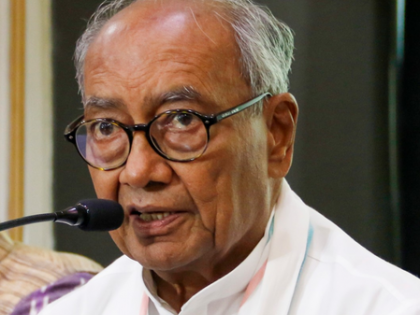Digvijaya Singh demands to increase wages of Indore's sanitation workers
By IANS | Updated: July 19, 2025 20:09 IST2025-07-19T20:04:22+5:302025-07-19T20:09:19+5:30
Indore, July 19 As Indore retained its top spot as the cleanest city in the country for the ...

Digvijaya Singh demands to increase wages of Indore's sanitation workers
Indore, July 19 As Indore retained its top spot as the cleanest city in the country for the eight time in a row, senior Congress leader and former Madhya Pradesh Chief Minister Digvijaya Singh said that 'sanitation workers', who are the real heroes, are forced to survive on minimum monthly wages.
He added that sanitation workers who made Indore as the cleanest city for eight times, "neither they get respect nor job security", and are forced to survive with minimum monthly wages, which is not enough to pay the monthly school fee of their children.
"Sanitation workers, who wake up every morning at 4 a.m., even if it is raining, and keep working to make Indore clean. But the sad part is that their monthly salary is just Rs 10,500, which is not even enough for their children's higher secondary education," Singh wrote on social media platform X.
He raised three basics demands of sanitation workers of Indore, urging Chief Minister Mohan Yadav and the State Urban Development Minister Kailash Vijayvargiya to provide job security and increase monthly wages as they deserve it.
"Indore's cleanliness will only be meaningful when the lives of sanitation workers are also clean, safe and respected. I would request Chief Minister and Urban Administration Minister to address these demands," Singh wrote.
Indore's consistent success in maintaining its cleanliness is not accidental, the Congress leader said.
It is the result of a multi-pronged approach encompassing robust waste management, smart infrastructure, strong civic engagement, and innovative services, he added.
Unlike many other cities, Indore has successfully implemented a system where every household and commercial establishment is encouraged to segregate waste into six distinct categories: wet, dry, plastic, e-waste, sanitary, and hazardous.
The fact is that Indore had become a leader in waste treatment as nearly all generated daily waste is processed and converted into valuable resources.
A large-scale Gobar-Dhan plant plays a crucial role, processing up to 550–692 tonnes of wet waste daily to produce bio-CNG and organic compost.
Indore has successfully transformed certain areas, including wards, markets, zoos, slums, and resident welfare associations (RWAs) into "zero-waste zones".
Within these communities, segregation, reuse, composting, and recycling are actively practised.
Beside all these, Indore district administration along with Municipal Corporation have launched several initiatives that were impactful, especially in behavioural change campaigns like "Bartan Banks" to discourage single-use plastics and "Jhola Banks" for cloth bags.
Citizens, students, shopkeepers, and local committees actively participate in cleanliness pledges and competitions.
To deter littering, the city utilises CCTV monitoring and imposes fines.
The municipal corporation even implements stern enforcement measures, including termination for non-compliant staff, highlighting their commitment to maintaining high standards.
Disclaimer: This post has been auto-published from an agency feed without any modifications to the text and has not been reviewed by an editor
Open in app